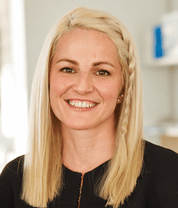
Professor Marina Pajic
Professor Marina Pajic is a leader in pancreatic cancer research. Since returning from a successful postdoctoral position at the Netherlands Cancer Institute and establishing her lab at the Garvan in 2013, Professor Pajic has developed an innovative program that builds on the unique infrastructure she has generated, a wealth of integrated human cancer genomic and gene product expression profiles, complex 3D and patient-derived mouse models, rapidly evolving technologies and close clinical links, to reveal new insights into the deregulation of molecules commonly hijacked in pancreatic cancer, which drive tumour heterogeneity, metastasis and chemoresistance. Her team is using this knowledge to inform the rational design of novel, tailored treatment options for patients with pancreatic cancer.
Her research is supported by the Snow Medical Fellowship, NHMRC, Cancer Council NSW, Pankind, ACRF, Cancer Institute NSW (CINSW), Ms Jane Hemstritch, the Girgensohn Foundation and Paul Ainsworth Foundation. As a Snow Medical Fellow, Professor Pajic has established a translational research program, which includes establishment of two new trials for pancreatic cancer, based on precision-medicine principles and her discovery work, during the fellowship. With more than 100 high-quality and highly cited publications in the field (more than 30,500 citations), Professor Pajic’s contributions have been recognised by several prestigious awards including the Australian Academy of Science 2020 Ruth Stephens Gani Medal for achievements in the field of applied cancer genomics and precision medicine for pancreatic cancer and the NSW Premier’s Outstanding Cancer Research Fellow Award. She takes an active role in training emerging scientists (Honours and PhD projects). Marina engages and communicates regularly with the public through Garvan’s public events and collaborative work with major pancreatic cancer foundations.
Medical Minds Podcast
Awards
- 2023NHMRC Investigator Grant Level 1
- 2021Snow Medical Research Foundation Fellowship
- 2020Australian Academy of Science Ruth Stephens Gani Medal
- 2019NHMRC RD Wright Biomedical Career Development Fellowship Level 2
- 2018Lorne Genome Young Investigator Award
- 2017Cancer Institute New South Wales (CINSW) Career Development Fellowship
- 2017NSW Premier's Award for Outstanding Cancer Research Fellow
- 2014Australasian Pancreatic Club (APC) Co-director; Co-organiser of annual scientific conferences
- 2014CINSW Career Development Fellowship
- 2013Travel Grants (CASS Foundation - Sydney Catalyst)
- 2012Conference Awards (EACR Cancer Genomics Conference - Cambridge - UK; Australian Division of International Academy of Pathology - 38th annual scientific meeting - Australia; EACR 22nd Biennial Congress - Barcelona - Spain)
- 2012European Association for Cancer Research (EACR) ambassador
- 2011CINSW Early Career Development Fellowship
- 2011Phillip Hemstritch fellowship in pancreatic cancer
- 2003University Postgraduate Award (University of Sydney) and Children’s Cancer Institute of Australia Postgraduate Scholarship (University of New South Wales)
- 2002Postgraduate Scholarship in Cellular Cancer Pharmacology (University of Sydney)
- 2001University postgraduate bursary award (University of Auckland)
Selected publications
See all publications- 2025Molecular Cancer Therapeutics10.1158/1535-7163.MCT-24-0704
Integration of Whole-Genome Sequencing Analysis with Unique Patient-Derived Models Reveals Clinically Relevant Drug Targets in TFCP2 Fusion-Defined Rhabdomyosarcoma.
- 2025Signal Transduction and Targeted Therapy10.1038/s41392-025-02232-9
Oncogenic proteome of pancreatic cancer extracellular vesicles: sodium/myo-inositol cotransporter as a potential marker.
- 2025Cellular Signalling10.1016/j.cellsig.2025.111775
Oncogenic small extracellular vesicles enriched in sphingosine-1-phosphate play a crucial role in pancreatic cancer progression.
- 2025Science Advances10.1126/sciadv.adq4416
Targeting the NPY/NPY1R signaling axis in mutant p53-dependent pancreatic cancer impairs metastasis.
- 2025Neoplasia (New York, N.Y.)10.1016/j.neo.2025.101138
MYH knockdown in pancreatic cancer cells creates an exploitable DNA repair vulnerability.
